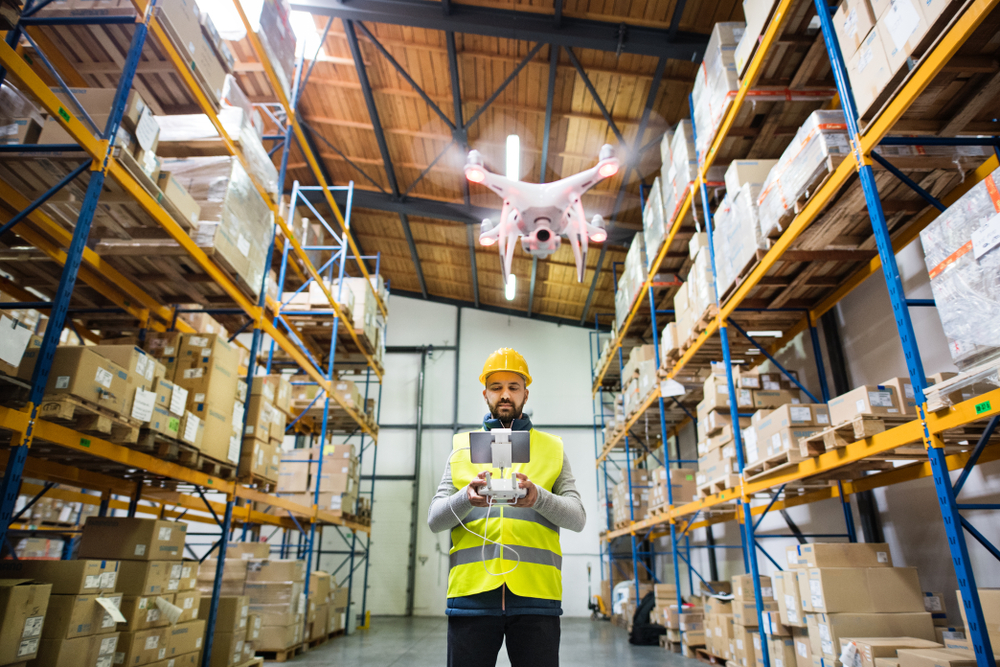The concept of using warehouse drones may appeal to logistics companies as the COVID pandemic continues to disrupt global supply chains. Drones, and other forms of warehouse automation, are among many technological solutions businesses could potentially turn to as they brace for a potential logistics crisis when the holiday shopping season gets underway. Replacing some human labor functions with drones, robotics, and automation could be cost-effective, and may help keep a supply chain workforce safe as the Delta variant continues to take its toll.
Companies contemplating turning to warehouse drones or other forms of automation should consider:
- The current applications of workforce drones;
- Upgrading warehouse management systems software;
- The importance of strategic thinking.
The Current Applications of Workforce Drones
Several years ago, warehouse drones were touted as the wave of the future. Flying drones would automate inventory counts, take over facility monitoring functions, and even move products from one part of a distribution center to another. Drone technology has not quite progressed that far, unfortunately. There are companies that advertise flying drone networks capable of scanning 200 to 400 pallets an hour, which includes the downtime spent recharging. However, as of now, most companies working on warehouse drone technology appear to be startups determined to bring new but as-of-yet untested products to the distribution center floor.
Drones currently used in work environments are mostly reliant on Wi-Fi networks, and are most effective for straightforward monitoring and security needs in more wide-open settings such as farms, airports, and utility facilities. This could change soon. Once drones are converted to the 5G telecommunications network standard, they will be able to operate much more independently, and could have many warehouse applications.
Investing in Warehouse Management Systems
In the short-term, warehouse operators may find it more cost-effective to upgrade warehouse management systems. Up-to-date warehouse management system (WMS) software provides many benefits including:
- Efficient product slotting—an effective WMS will eliminate much of the engineering work, manual warehouse mapping and data inputs needed for most warehouse slotting systems;
- Task performance management—an efficient WMS will streamline a labor-intensive data process needed to analyze a facility’s performance and can calculate the optimum time needed to complete tasks;
- Minimizing in-warehouse travel time—warehouse workers spend many hours traveling between facility locations, but a good WMS can help the workforce balance priorities and reduce this travel time, increasing workforce efficiency.
The Importance of Strategic Thinking
An efficient WMS can enable warehouses to orchestrate automation technology that is currently available and can make facilities more efficient, such as Automated Storage and Retrieval Systems (ASRS). But no amount of automation, or sophisticated system software, can replace the strategic thinking needed from executives and supply chain operators to keep their companies competitive.
Businesses may need to think outside the box to adapt to current supply chain disruptions. The global pandemic exposed the fragility of interconnected global supply chains. Logistics companies should consider pivoting towards regional and domestic supply chains, rather than more traditional practices of finding the cheapest manufacturer or supplier on the far side of the world.
Finding the right strategic partners is also vital. A good plastic pallet pooling company, for example, can help make logistics operations more efficient. iGPS plastic pallets incorporate smart features that make them traceable throughout a supply chain. These features allow logistics companies to capture data at any point of distribution, ensuring better planning, efficiency, and helping to lower a company’s Total Cost of Business (TCOB). This makes iGPS plastic pallets ideal for all automated systems.
Warehouse drones may be close to revolutionizing the way warehouses operate but remain an unproven if exciting technology. Companies should monitor the progress of this technology, while investing in the warehouse systems and strategic partnerships they need to stay competitive.
Companies committed to supply chain efficiency use iGPS plastic pallets for all their shipping needs. Our lightweight, recyclable plastic pallets incorporate smart features, can help keep warehouse workers safe, and reduce your Total Cost of Business. For more information, contact us at 1-866-557-0047, email a specialist at switch@igps.net, or visit our contact page.



